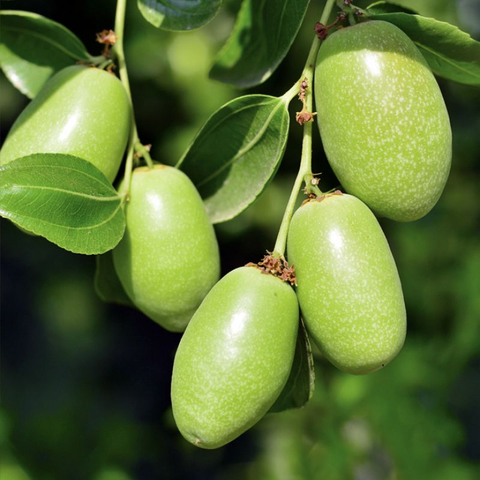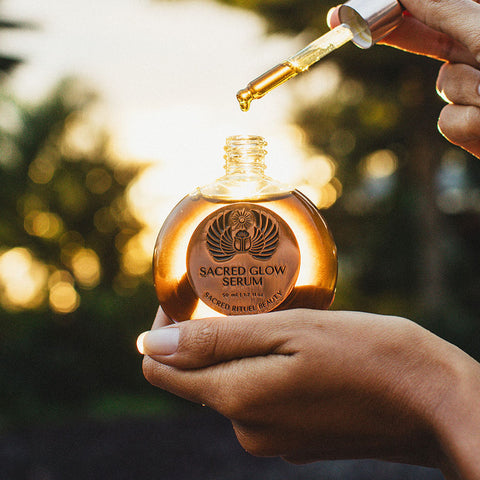
Ingredient Page: Jojoba Oil
Jojoba Oil
As the first ingredient listed in our Sacred Serum, organic jojoba oil (pronounced “ho-ho-ba”) makes a statement – for a good reason! Jojoba oil has a storied history dating back centuries to Native American tribes in the U.S. and Mexico when used for medicinal purposes to treat burns, sores, and wounds. Over time jojoba oil has been transformed into a powerhouse natural alternative throughout the cosmetics industry and personal care products alike.
However, not all oils are created the same (more on that below). At Sacred Rituel we take pride in delivering environmentally and socially responsible products made with only organic, raw ingredients. We work to restore beauty and balance in our bodies and the planet by crafting the highest quality organic skincare products through ethical farming practices and ancient alchemy.
In this piece, we’ll detail what jojoba oil is, the benefits to consider, and why choosing quality ingredients make a difference for you and the planet!
For more on reconnecting with the power and healing of Earth Magick, check out our co-founder and formulator, Marysia Miernowska’s, best-selling book: The Witch’s Herbal Apothecary! She explains how to grow medicine, harvest from the wild or home garden, process plants, and even make seasonal remedies!
|
Type: Jojoba oil comes from the seed of the Simmondsia chinensis plant found native to southern California, Arizona, and Mexico. History: The O’odham tribe used jojoba oil to treat burns and sores. Jojoba oil was further developed and used in the whaling industry (due to the wax produced from the nut), pharmaceuticals, and skincare. It’s important to see the sourcing behind your jojoba oil to ensure the highest efficacy and potency. It’s best to look for organic, cold-pressed oils. Benefits: Fight acne, heal wounds, soothe sunburns, fight free radicals, reduce inflammation A Sacred Secret? Jojoba is a variation of the native Papago word, “howhowi” and is composed of almost 98% pure waxes (this explains the natural, non-greasy feel). (1) |
Background: Jojoba Oil
Jojoba oil is naturally nourishing to the skin as it’s rich in Vitamin E, B, antioxidants, and minerals like chromium, copper, and zinc. It’s a versatile ingredient used broadly across products for hair, skin, and even cuticle care!
Of more than 350,000 identified plant species, jojoba is the only one which produces significant quantities of liquid wax esters akin to the natural restorative esters human sebaceous glands produce. This means Jojoba oil can mimic the skin’s natural sebum, which conditions and seals in needed moisture to keep skin healthy and luminous.
The terms "jojoba oil" and "jojoba wax" are often used interchangeably because the wax visually appears to be a mobile oil. Still, as a wax, it is composed almost entirely (~97%) of mono-esters of long-chain fatty acids and alcohols, accompanied by only a tiny fraction of triglyceride esters.
This composition accounts for its extreme shelf-life stability and extraordinary resistance to high temperatures compared with true vegetable oils.
We can look at jojoba oil as the great mimicker of oils, and that’s not a bad thing at all! This means added hydration, protection from free radicals, and even a lightweight, non-greasy feel when applying.
Benefits Include:
- Balance oil production
- Fight acne
- Heal wounds
- Soothe sunburn
- Fight free radicals
- Reduce inflammation
- Vitamin E in it eliminates free radicals.
Sacred Serum & Organic Jojoba Oil
Sacred Serum adapts to your skin type due to a balanced formula of botanical super-food flowers, plant and seed oils. Working synergistically with the 26 other organic ingredients in Sacred Serum, jojoba oil goes deep into the skin to feed, protect and beautify.
Our organic nutrients and antioxidants penetrate to provide a healthy glow while balancing your skin tone.
Sacred Serum Benefits:
- Deeply moisturizes for an instant visible glow
- Reduces inflammation and promotes cell regeneration for a visibly youthful glow in a matter of days.
- Amplified by 777 mg USA-certified organic full-spectrum Hemp extract
- Has a light texture that quickly absorbs into the skin for an instant smoothing, soothing glow
- Protects from environmental damage with powerful antioxidants, fatty acids and vitamins A, B, C, D, E
- Unbelievably smoother, brighter skin, visibly transformed in a few days
Why Choose Organic, Cold-Pressed Jojoba Oil?
Organic ingredients have more potent nutrients and are free from chemicals and pesticides that enter your body. The key to beautiful skin lies in vitamins and nutrients, so we only choose to source the finest ingredients without chemicals and pesticides.
- Organic (Biodynamic) Label: Refers to how ingredients are grown and harvested.
- Cold-Pressed Label: Refers to how ingredients are processed from a plant or seed to an oil. When oils are cold-pressed, they are extracted from their source using mechanical methods rather than heat or solvents.
With cold-pressed oils, there is very little processing, which allows it to retain important nutrients responsible for healing. Ultimately, cold pressing delivers a potent product that's highly effective AND safe because there aren't any additives. It’s a win/win for your skin!
All Sacred Rituel ingredients are made without:
Preservatives: May be used in cosmetics to prevent the growth of harmful bacteria and mold. Parabens and formaldehyde-releasing preservatives are commonly used preservatives in cosmetic and personal care products.
Parabens: Are preservatives used in a wide variety of personal care products and foods to prevent the growth of microbes. These endocrine-disrupting chemicals can be absorbed through skin, blood and the digestive system.[1]
Phthalates: Pronounced THAL-ates, these chemicals, which are linked to endocrine disruption, developmental and reproductive toxicity, and cancer, have been banned from cosmetics in the European Union, but still remain prevalent in U.S. products.
Methylisothiazolinone (MIT) & Methylchloroisothiazolinone (CMIT): They may be hard to pronounce, but they can be even harder on the body. These common preservatives are found in many liquid personal care products and have been linked to lung toxicity,[1] allergic reactions, and possible neurotoxicity.

Sacred Secrets: All Things Jojoba Oil
What is jojoba oil?
Jojoba oil is a natural oil extracted from the seed of the Simmondsia chinensis plant. It is a natural emollient that is used in a variety of skincare and beauty products. The wax found within the jojoba nut makes the oil feel very natural (similar to the skin’s natural oils). This means it is easily absorbed and does not leave a greasy residue.
Where does jojoba oil come from?
Jojoba oil comes from the seeds of the jojoba plant (Simmondsia chinensis), which is native to the southwestern United States and northern Mexico. The plant is well adapted to desert conditions and can grow up to 15 feet tall with a deep root system that can withstand drought and high temperatures.
The jojoba plant produces small, greenish-yellow flowers that develop into a woody fruit containing one to three seeds. These seeds, which make up about 50% of the weight of the fruit, are rich in a waxy substance that can be extracted and processed to produce jojoba oil.
How is jojoba oil made?
Jojoba oil is extracted from the seeds of the jojoba plant (Simmondsia chinensis) using a cold-pressing method. Here are the general steps for making jojoba oil:
- Harvest the jojoba seeds: Jojoba seeds are harvested from mature jojoba plants when they are fully grown and dry.
- Clean the seeds: The harvested seeds are cleaned to remove any dirt, debris, or other impurities.
- Dry the seeds: The cleaned seeds are spread out and allowed to dry in a well-ventilated area.
- Crush the seeds: Once the seeds are fully dry, they are crushed to break the outer shell and release the oil-rich seed kernel.
- Press the seed kernel: The crushed seed kernel is then pressed to extract the oil. This is typically done using a cold-pressing method, which involves applying pressure to the seeds without using heat or solvents.
- Filter the oil: The extracted oil is filtered to remove any remaining impurities.
- Store the oil: The filtered oil is then stored in a clean, dark, airtight container to preserve its quality and freshness.
What are the benefits of jojoba oil?
Jojoba oil is a great moisturizer, anti-inflammatory, and antioxidant. It can help reduce the appearance of wrinkles, soothe dry and irritated skin, and even help with acne. It also is considered non-comedogenic, it does not clog pores, which is beneficial for those with acne-prone or oily skin.
What does jojoba oil smell like?
The natural scent of jojoba oil is often described as slightly sweet or nutty, with a subtle earthy undertone. Overall, the scent of jojoba oil is generally not overpowering and is often well-tolerated by those with sensitivities to strong fragrances.
What does jojoba oil feel like?
Jojoba oil has a smooth, silky texture that feels similar to natural skin oils, making it an excellent moisturizer and emollient for the skin and hair. When applied to the skin, jojoba oil forms a protective barrier that helps to lock in moisture, leaving the skin feeling soft, smooth, and hydrated.
How do you use jojoba oil?
Jojoba oil can be used directly on the skin or mixed with other creams and lotions. It can also be used as a hair oil or scalp massage oil. With Sacred Serum we recommend:
- Starting with a clean, dry face, generously spray our Sacred Rose Mist to your face and neck.
- Using the vial, apply Sacred Serum to your open palm or directly to your skin.
- Massage and distribute by patting and lightly spreading the serum gently onto your face being sure to apply evenly to allow maximum absorption.
How often should you use jojoba oil?
It is best to use jojoba oil as needed and according to your skin type. If you have dry skin, use it more frequently, while if you have oily skin, use it less often. With Sacred Serum, we recommend using 2 times/day for maximum benefits and best absorption.
Does jojoba oil work on all skin types?
Jojoba oil is considered safe for all skin types, including sensitive, oily, and acne-prone skin. Its unique composition allows it to be easily absorbed without leaving behind a greasy residue.
Dry Skin: Jojoba oil can provide deep hydration and moisturization, helping to improve the appearance of fine lines and wrinkles.
Oily Skin: As a non-comedogenic ingredient, jojoba oil does not clog pores (meaning less breakouts).
Is jojoba oil good for acne?
Yes, jojoba oil has anti-inflammatory and antibacterial properties that can help reduce the appearance of acne. It may also help calm and soothe irritated skin associated with acne. The antibacterial properties work to prevent the growth of bacteria on the skin, further reducing the risk of infection and inflammation.
Can jojoba oil help with wrinkles?
Yes, jojoba oil is known to help reduce the appearance of fine lines and wrinkles by moisturizing and nourishing the skin. As a natural emollient, it keeps skin hydrated and supple. The antioxidant properties and collagen production from jojoba oil similarly protect skin from damage caused by free radicals (unstable molecules that can contribute to aging) while also boosting the skin’s structure and elasticity.
How long does jojoba oil last?
Jojoba oil has a shelf life of up to two years, but storing it in a cool, dry place away from direct sunlight is best. Compared to other oils, jojoba oil does have a longer shelf life due to its stability and resistance to rancidity.
Sources:
-
Gad HA, Roberts A, Hamzi SH, Gad HA, Touiss I, Altyar AE, Kensara OA, Ashour ML. Jojoba Oil: An Updated Comprehensive Review on Chemistry, Pharmaceutical Uses, and Toxicity. Polymers (Basel). 2021 May 24;13(11):1711. doi: 10.3390/polym13111711. PMID: 34073772; PMCID: PMC8197201.






